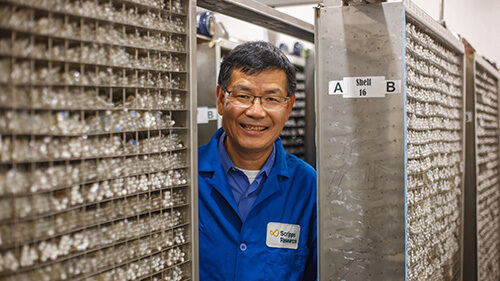
Ben Shen, PhD, is Chair of the Department of Chemistry on the Florida Campus and Director of the Natural Products Discovery Center at Scripps Research. As winner of the 2020 Outstanding Mentor Award (Florida), Ben discusses gratitude, self-belief and perseverance as key elements to a successful scientific career.
How do you regard this award and see your success as a mentor?
I have an immense sense of gratitude for this award. While I’ve never questioned my commitment to the students and postdocs in my group over the years, it is still truly humbling to know that people appreciate my mentorship. I try to remind others to be grateful as well, especially with their successes. Whatever you accomplish you can view in a couple of different ways. One way is to say that it’s because of you and no one else; that it’s due to your own commitment and talent. The other way is to acknowledge how fortunate you were; that you were surrounded by wise people who recognized what was possible in you and that helped make it happen. I prefer to view things this second way, and it has made me much happier and more effective as a mentor.
What effect have your trainees had on you?
Although I continue to get older, I’m constantly working with students and postdocs in their twenties. Not many people in this world have such an opportunity to spend thirty or forty years of their life working with this age group. This group of people are always so hopeful. And they know that anything is possible, that they’re invincible, that they can change the world. That to me is one of the great privileges of being a mentor or educator and their attitude really rubs off on you. Toward the end of every year, I always send my group a note to tell them how fortunate I feel, that every day I wake up and look forward to going into the lab to interact with these people. I get so much energy from graduate students passing their qualifications, postdocs receiving their independent job offers, or former lab members making steady career advancements. These talented people at Scripps Research make me eternally optimistic.
How do you help your lab members overcome setbacks?
I try to create an environment that’s uplifting and I actively encourage my students to explore things that they are most passionate about, even if it tests their limits. Every day mentors are faced with students who come to them and tell them that nothing is working in the lab. And I say no, it’s not that nothing works, it’s just that you are on the very cusp of making great breakthroughs, so you just need to look at this with a different perspective. If you can convey this type of mindset as a mentor, then this can help them reframe setbacks as opportunities. On the contrary, if you tell me that everything is working perfectly, then you might only be pursuing something very trivial. So, I tell my students that they need to take risks and make mistakes. And when you’re young, these aren’t even really mistakes; they’re just part of the adventure.
What are the strengths required for research in such a competitive academic setting?
Science at this level is hard, there’s just no question. There are several instances of frustration and failure, but with perseverance, these iterate over time to become successes. With burning questions and mental toughness, you will be rewarded. As well as perseverance, you need to commit to high standards and put in that extra effort to go from the ordinary to the extraordinary. Quite often you can get 80% of things done in around 20% of your time and you feel great. But it’s that last 20% that can sometimes take more than 80% of your time to finish. Here at Scripps Research, we are pushing you to realize your potential and go that extra distance to cross the finish line. At the end of the day, I also think that you need to pursue something that you really believe in. Curiosity is clearly great, but it needs to be coupled with a real desire to impact society. To know that your science will make a meaningful difference in the world is the ultimate motivation.
The Outstanding Mentor Award was created to pay tribute to the remarkable faculty who actively serve as effective mentors of graduate students and postdocs. Nominees are elected by current graduate students and postdocs, evaluated primarily on the total number of nominations and contents of a questionnaire provided during the nomination process, and by a selection committee composed of members of the Society of Research Fellows.